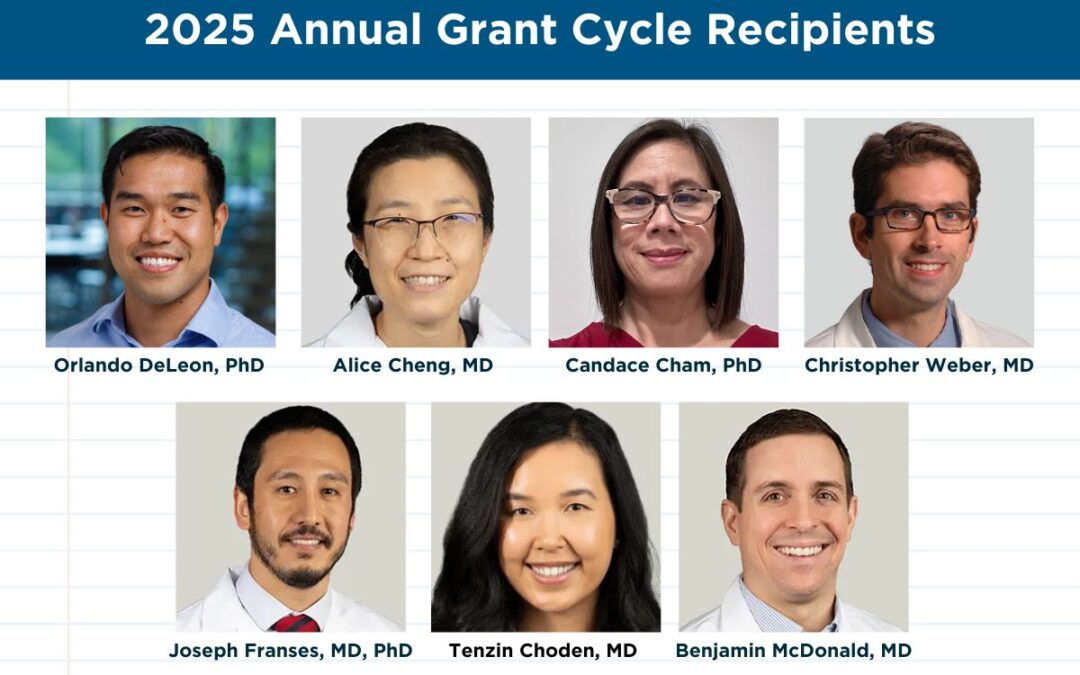Announcing $500K+ In New Research Grants:
Sowing “Seeds” of Hope for Patients with Digestive Diseases
Investing “seed” funding in novel research projects can reap significant rewards. It is the core of the GI Research Foundation’s mission. The 2025 Annual Grant Cycle has funded seven studies allowing investigators to explore new discoveries that could improve the diagnosis and treatment of digestive diseases, with the potential for prevention and cures.
The Foundation’s annual grant awards program, led by scientific advisors, Dr. David T. Rubin and Dr. Eugene Chang, uses a robust scientific and lay review process to select projects receiving funding. We are thrilled to announce the recipients of the 2025 awards.
Dr. Orlando DeLeon, Dr. Alice Cheng, and Dr. Candace Cham are leading research projects to better understand what factors threaten a healthy gut microbiome and how diet and nutrition can mitigate these threats, particularly in patients with inflammatory bowel disease (IBD). A healthy gut microbiome is key to overall health and could aid in preventing and treating IBD, as well as other conditions like diabetes, heart disease, anxiety, and depression.
Dr. Christopher Weber and Dr. Joseph Franses are leading studies to better treat and detect digestive cancers—colorectal cancer and primary and metastatic liver cancer. These digestive cancers are among the leading causes of death worldwide. With diagnoses on the rise, especially among younger patients, and an increased cancer risk in IBD patients, advancing early detection tools and developing personalized treatment approaches is imperative.
Dr. Tenzin Choden is investigating how IBD uniquely impacts older adults, who represent 30% of the overall IBD population and 10-15% of new diagnoses. Older adults with IBD face higher rates of comorbidities such as undernutrition, anxiety, depression, and cancer. These comorbidities present unique challenges with drug interactions that have not been adequately studied. Research on older adults with IBD is limited, leaving clinicians without data to guide care for this vulnerable group. Dr. Choden will use data from the registry created with this funding to help address these challenges.
With previous funding from the GI Research Foundation, Dr. Benjamin McDonald identified a pre-symptomatic stage of perianal Crohn’s disease (subclinical pCD) and developed MRI- and ultrasound-based tests for diagnoses—allowing treatment to begin immediately. Twenty-five percent of Crohn’s Disease (CD) patients suffer pCD, a painful and debilitating disease subset. This grant builds on this paradigm-shifting work, supporting the launch of large-scale imaging of subclinical pCD and the collection of biopsy samples to achieve more precise characterization of the microbiome and patients’ tissues.
2025 Annual Grant Cycle Recipients
Orlando DeLeon, PhD | $100,000
Metabolic Network Driven, Host-Independent Circadian Rhythms of the Gut Microbiota and IBD
Alice Cheng, MD | $100,000
Eating For Two: Exploring the Impact of Fiber on Microbiome Configuration and Function
Candace Cham, PhD | $100,000
Have Your Cake and Eat It, Too: Can Fiber Mitigate the Negative Effects of A Western Diet?
Christopher Weber, MD, PhD | $50,000
Development of Personalized Tumor Specific TCR-Based Colorectal Cancer Treatment
Joseph Frances, MD, PhD | $50,000
Defining Targetable Circulating Tumor Cell Biodiversity in Hepatocellular Carcinoma
Tenzin Choden, MD | $45,000
Study of Outcomes and Aging in IBD registry (SOAR-IBD)
Benjamin McDonald, MD, PhD | $68,000
Developing New Diagnostic and Therapeutic Strategies for Perianal Crohn’s Disease

